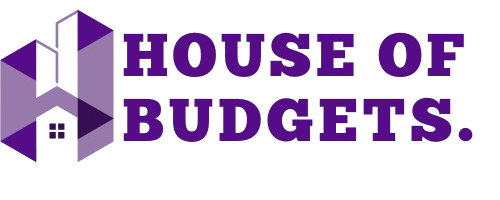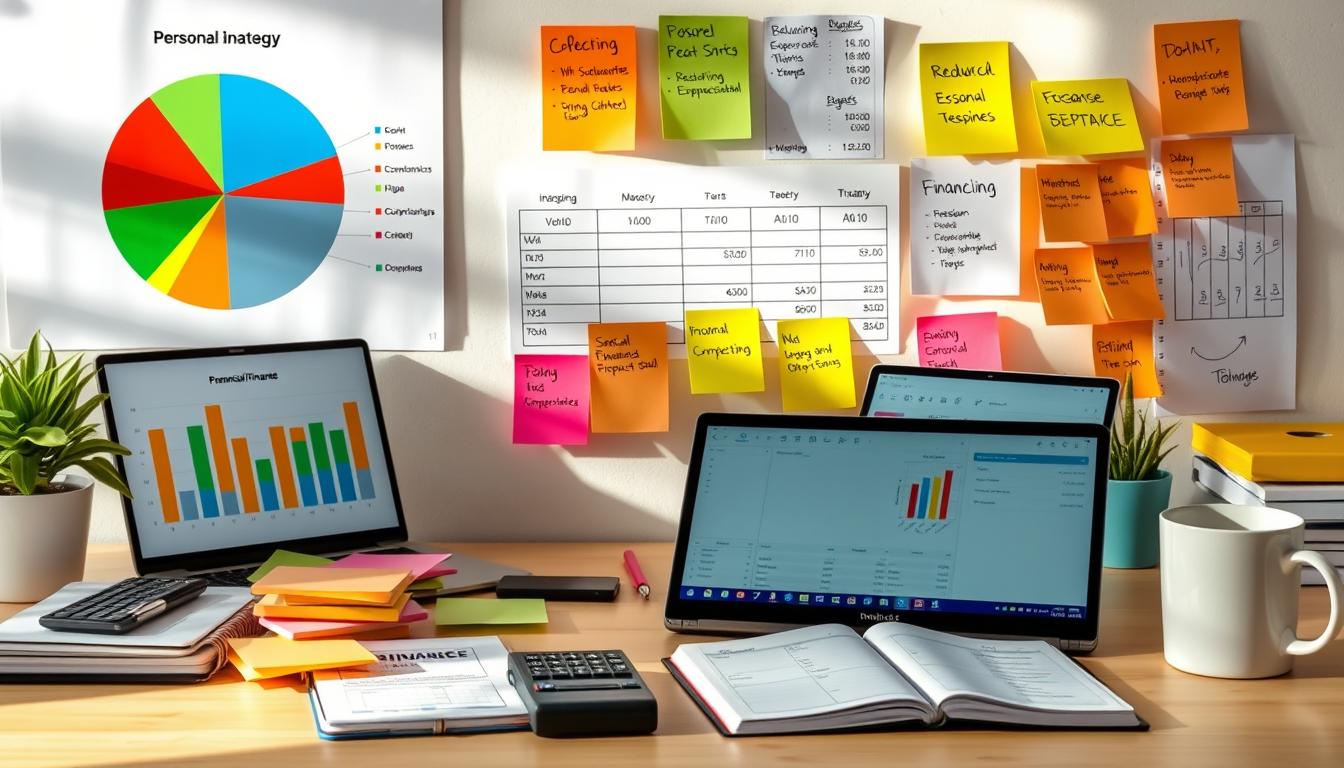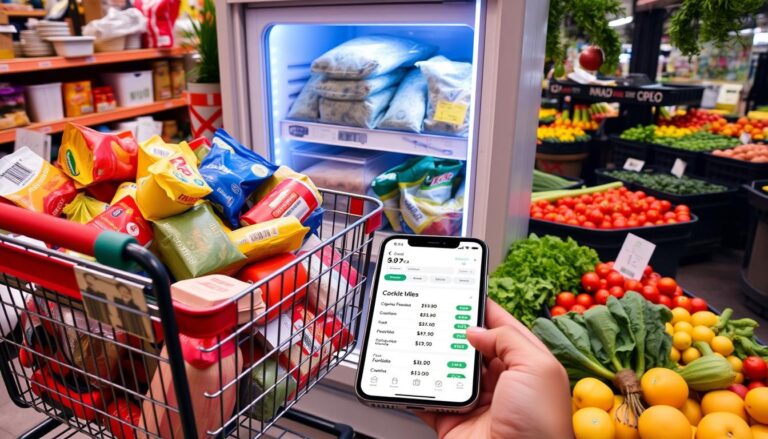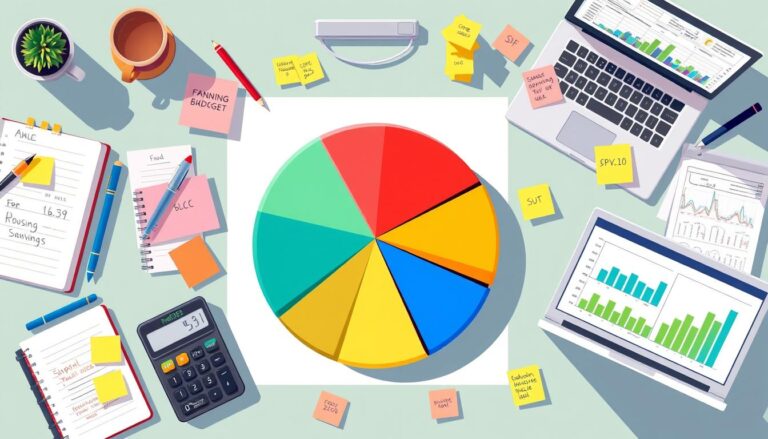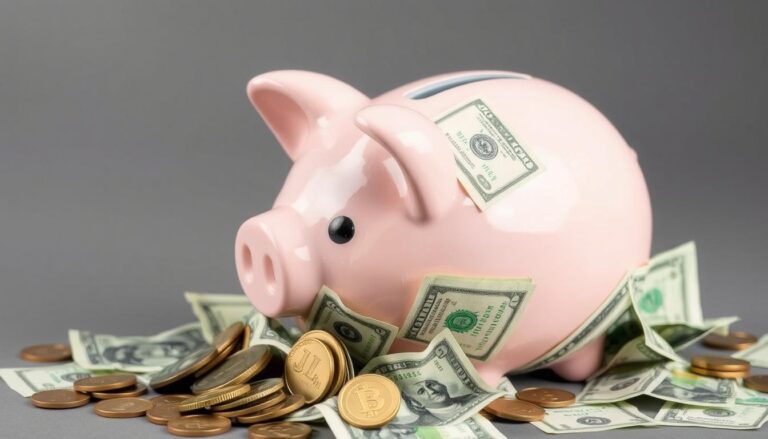Best Way to Budget for Financial Success
Do you feel like money is in control, not you? Imagine changing that with a smart budget. With 70% of Americans stressed about money, finding the right budget could bring peace.
Budgeting isn’t about cutting back—it’s about making smart choices with your money. It helps you see where your cash goes and how to make it grow. With good budgeting tips, you can turn financial mess into success.
Numbers show budgeting works: 60% of people who budget feel more in charge of their money. Those who budget well save 20% of their income, compared to 10% for those without a plan.
Table of Contents
Understanding the Fundamentals of Budgeting
Budgeting is like a map to financial success. It helps you manage your money better. This way, you can see your financial future more clearly.
Learning about budgeting is key to being financially healthy. Studies show that people who budget are 76% more likely to reach their money goals. This is compared to those who don’t budget at all.
What Makes a Budget Essential
A budget is like a GPS for your money. It helps you deal with money problems confidently. Here’s why budgeting is so important:
- It shows you where your money goes
- Helps spot money you don’t need to spend
- Guides you to reach your money goals
- Reduces money stress
Key Components of a Successful Budget
To make a good budget, focus on these main parts:
- Keep track of how much money you make
- Sort out your expenses into categories
- Set money goals that are realistic
- Check your budget regularly
“A budget is telling your money where to go instead of wondering where it went.” – Dave Ramsey
Benefits of Systematic Budgeting
Using money management techniques can really boost your financial health. Research shows that people who track their spending save about 15% more. This is compared to those who don’t keep track.
By using budgeting strategies, you can:
- Build financial awareness
- Improve how you spend money
- Work towards financial stability in the long run
- Feel less stressed about money
Best Way to Budget: The Step-by-Step Process
Learning to budget well is a journey from chaos to control. It might seem tough at first, but breaking it down helps. This makes budgeting easier and more empowering.
- Income Assessment: Figure out your after-tax monthly income
- Budget System Selection: Pick a budgeting method that suits you
- Expense Tracking: Keep a close eye on your spending
- Savings Automation: Make automatic transfers to savings
- Regular Review: Adjust your budget every three months
Now, let’s explore each step with tools that simplify budgeting.
“A budget is telling your money where to go instead of wondering where it went.” – Dave Ramsey
| Budget Step | Key Action | Recommended Timeline |
|---|---|---|
| Income Assessment | Calculate net monthly income | First month of budgeting |
| Budget System | Select 50/30/20 or 70/20/10 method | Within first two weeks |
| Expense Tracking | Use digital apps or spreadsheets | Ongoing, monthly review |
| Savings Automation | Set up automatic transfers | Immediately after income receipt |
| Budget Review | Analyze spending patterns | Every 3 months |
The best budget is one that fits you. Start simple, stay on track, and see your finances grow.
Calculate Your After-Tax Income
Understanding your true income is key to managing your money. Knowing how much you take home each month is crucial. It helps you create a solid budget and develop smart spending habits.
Determining Your Net Income
Your net income is the money you get after taxes and deductions. To find it out, follow these steps:
- For salaried employees: Divide your annual salary by 12
- For hourly workers: Multiply your hourly rate by 40 hours a week
- Multiply your weekly earnings by 52 weeks
- Divide your annual total by 12 to get your monthly income
Including Additional Income Sources
Don’t just look at your main paycheck. Also, track:
- Freelance or contract work
- Investment dividends
- Rental income
- Side gig earnings
“Know your numbers. Every dollar counts in personal finance.”
Understanding Deductions and Adjustments
Many deductions affect how much you take home. Key ones to check include:
| Deduction Type | Impact on Income |
|---|---|
| Federal Taxes | Typically 10-25% of gross income |
| State Taxes | Varies by state (0-13%) |
| Social Security | 6.2% of gross earnings |
| Medicare | 1.45% of gross earnings |
Pro tip: Review your pay stub carefully to understand all deductions affecting your net income.
Setting Clear Financial Priorities
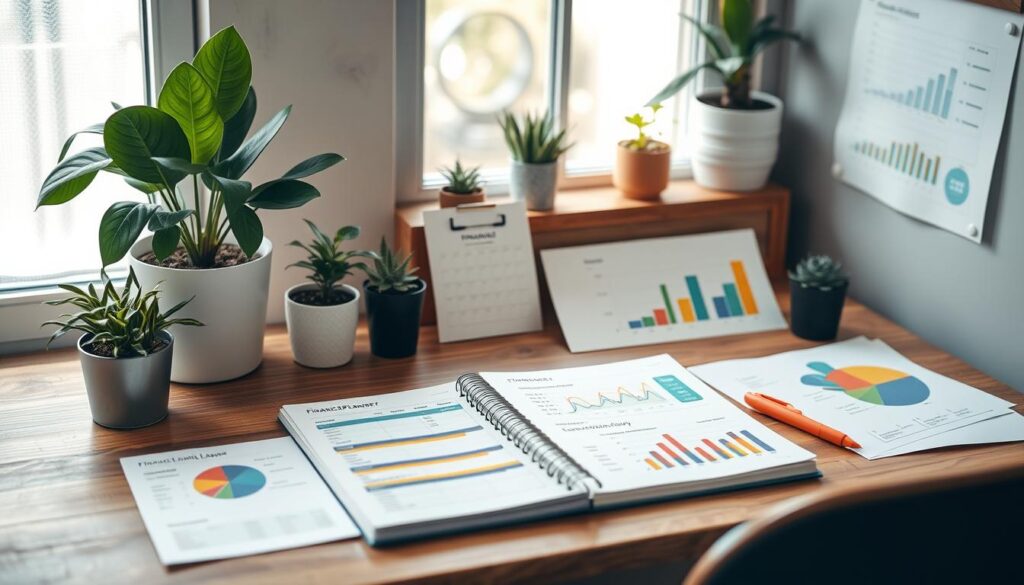
Setting clear financial priorities is key to good personal finance budgeting. About 70% of Americans live paycheck to paycheck. A smart financial plan can greatly improve your financial health.
Your financial journey starts with setting and prioritizing goals. Here are some tips to help you on your way:
- Start with an emergency fund of $500 to $1,000
- Save for the future, aiming for 3-6 months of living expenses
- Set both short-term and long-term financial goals
“Success in financial planning is about setting realistic goals and consistently working towards them.” – Financial Planning Expert
Using financial planning tools can change how you budget. Here are some ways to do it:
- Keep a close eye on your spending
- Try digital budgeting apps
- Automate your savings
Studies show that regular budgeting helps achieve financial goals three times more. Focus on saving, paying off debt, and planning wisely. This builds a strong financial base.
Your financial goals should match your personal needs. Whether it’s for education, retirement, or an emergency fund, each goal needs focus and discipline.
Essential Categories for Your Budget Breakdown
Creating a detailed budget means knowing the different types of expenses in your life. Good budgeting strategies need a smart way to sort and track your spending.
Fixed vs. Variable Expenses
Your budget should split into two main areas:
- Fixed Expenses: Monthly costs that stay the same, like rent, insurance, and loan payments
- Variable Expenses: Costs that change, such as groceries, utilities, and entertainment
Needs vs. Wants Classification
Budgeting helps you focus on what’s important by dividing needs from wants. A good plan is to use your money wisely:
- Needs (50-60% of income):
- Housing
- Transportation
- Food
- Utilities
- Wants (30-40% of income):
- Entertainment
- Dining out
- Subscriptions
“The key to successful budgeting is not about how much you earn, but how wisely you allocate your resources.” – Financial Expert
Emergency Fund Allocation
Setting up an emergency fund is key to budgeting. Try to save 3-6 months of living costs for unexpected times.
Using these budgeting tips, you’ll build a strong financial plan. It helps you keep track of spending, focus on what’s important, and secure your financial future.
Popular Budgeting Methods and Systems
Discovering the right budgeting strategies can change how you manage your money. Not all methods work for everyone. So, it’s good to try different ones to find what fits you best.
Let’s look at some popular ways to budget your money:
- 50/30/20 Rule: A classic way to split your income
- 50% for essential needs
- 30% for discretionary wants
- 20% for savings and financial goals
- Envelope Method: A cash-based system
- Use cash in different spending envelopes
- Helps avoid overspending by limiting cash
- Good for those who like to see their money
- Zero-Based Budgeting: Tracks every dollar
- Every dollar has a purpose
- Ensures no money is left unaccounted for
- Helps you spend more mindfully
“The best budget is the one you can actually stick to.” – Financial Planning Expert
Each budgeting method has its own benefits. Your best choice depends on your income, spending, and goals. Try out different methods to see what works best for you.
Remember, the secret to good budgeting is sticking to it and being flexible. Don’t hesitate to change your method as your finances change.
Smart Strategies for Expense Tracking
Learning to track your expenses is key to better financial health. A good budget tracking system can change how you manage money. It helps you control spending and reach your financial goals.
Today’s financial tools have changed money management. Over 70% of people find tracking easier with budgeting apps.
Digital Tools and Apps for Smart Budgeting
Choosing the right digital tool is crucial for smart budgeting. Here are some top tips:
- Choose apps that connect with your bank accounts
- Look for apps that track expenses in real-time
- Find tools that help you categorize expenses
- Pick apps that show your budget clearly
“The key to successful budgeting is consistent tracking and honest self-assessment.” – Financial Expert
Record-Keeping Best Practices
Keeping good records is essential for clear finances. Here are some tips:
- Record every transaction right away
- Save receipts, digital or physical
- Keep expenses organized with categories
- Check your budget every week
Monthly Review Techniques
Regular budget checks keep you on track. Studies show that reviewing budgets quarterly can improve finances and savings.
| Review Frequency | Financial Impact |
|---|---|
| Weekly Check-ins | Catch small spending patterns |
| Monthly Deep Dive | Adjust budget categories |
| Quarterly Analysis | Evaluate long-term financial goals |
Pro tip: Using expense-tracking tools can cut unnecessary spending by 20-30%. They are a valuable tool for smart budgeting.
Automating Your Savings and Payments
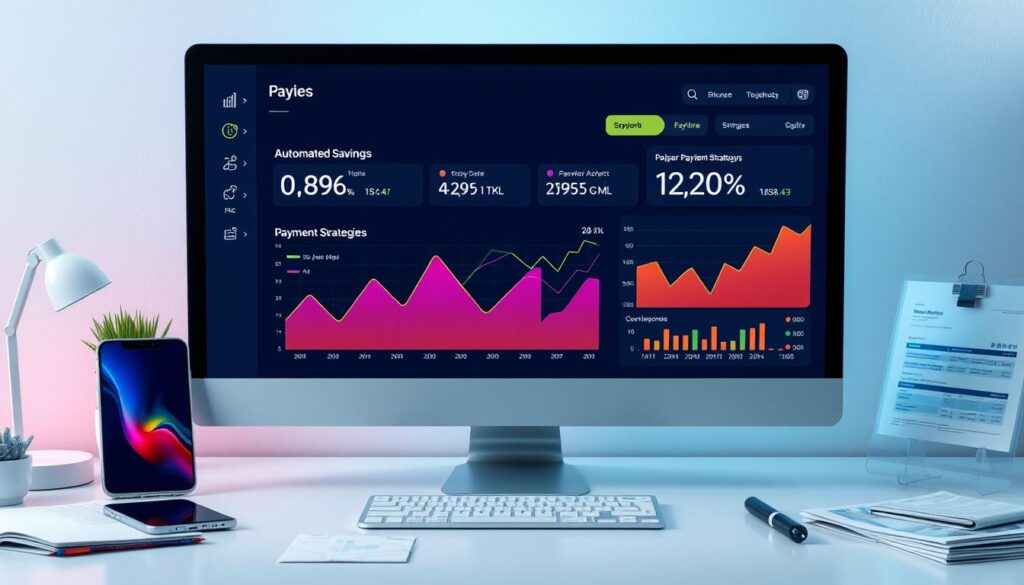
Using smart budgeting habits through financial automation can change how you manage money. It makes tracking easier and cuts down on missed payments or savings. This way, you can focus more on your financial goals.
“Automation turns good intentions into consistent financial actions.” – Financial Planning Expert
Studies show the benefits of automated finances:
- 82% of people find automatic payments help manage finances more effectively
- Individuals who automate savings increase their savings rate by 10-20%
- Nearly 60% report reduced financial stress with automated payments
Good budgeting methods include automating different financial areas:
- Set up automatic transfers to emergency savings accounts
- Configure bill payments to prevent late fees
- Establish automatic retirement contributions
| Automation Type | Potential Monthly Savings | Stress Reduction |
|---|---|---|
| Bill Payments | $35 in late fee prevention | High |
| Savings Transfers | $200-$300 additional savings | Moderate to High |
| Retirement Contributions | Potential employer matching | High |
Automating your finances helps you make steady progress toward your goals. Remember, the key is setting up these systems and periodically reviewing them to ensure they align with your evolving financial objectives.
Managing Debt Within Your Budget
Managing personal finance budgeting means more than just tracking expenses. It’s a way to get rid of financial burdens and build a stable future.
Good money management can change how you see debt. Learning to prioritize and reduce what you owe is key for a healthy financial future.
Debt Repayment Strategies
There are two main ways to pay off debt:
- Debt Avalanche Method: Focus on high-interest debts first to save on interest.
- Debt Snowball Method: Pay off the smallest balances first to build momentum.
Prioritizing Different Types of Debt
| Debt Type | Priority Level | Recommended Action |
|---|---|---|
| Credit Card Debt | High | Focus on reducing it right away |
| Personal Loans | Medium | Make consistent payments |
| Mortgage | Low | Stick to regular payments |
Building Credit While Budgeting
Here are tips for improving your credit while budgeting:
- Always make payments on time.
- Keep your credit card use under 30%.
- Avoid opening too many new credit accounts.
“Your debt doesn’t define you, but how you manage it does.” – Financial Wisdom
Remember, managing debt is a long-term effort. By using these strategies, you’ll slowly reduce financial stress and build a stronger financial base.
Conclusion
Learning to budget is a journey, not a one-time task. With 65% of Americans living paycheck to paycheck, it’s key for financial stability. Your skills will grow, helping you face financial challenges and secure your future.
Starting to budget might feel tough, but it’s worth it. It takes time, usually three to four months, to get the hang of it. The important thing is to stay consistent and open to change. Using zero-based budgeting and setting SMART goals will help you manage your money better.
Your financial health needs regular checks and flexibility. Changes in income, unexpected costs, or big life events will ask for budget tweaks. View your budget as a dynamic tool that grows with you. Embracing this journey will help you move from just managing money to building wealth and financial freedom.
Keep working towards your financial goals. Track your progress, celebrate small victories, and keep learning. With persistence and the right strategy, your budget will become a powerful tool for financial success.
FAQ
What is the most important first step in creating a budget?
How often should I review and update my budget?
What budgeting method works best for beginners?
How can I track my expenses effectively?
How much should I save for an emergency fund?
What is the most important first step in creating a budget?
How often should I review and update my budget?
What budgeting method works best for beginners?
How can I track my expenses effectively?
How much should I save for an emergency fund?
FAQ
What is the most important first step in creating a budget?
The first step is to figure out your after-tax income. This includes all your earnings from jobs, investments, and side gigs. Knowing your disposable income is key to a good budget.
How often should I review and update my budget?
Review your budget every month. This lets you see how you’re spending and make changes. Your budget should change as your life does.
What budgeting method works best for beginners?
The 50/30/20 rule is great for beginners. It says to spend 50% on needs, 30% on wants, and 20% on savings and debt. It’s simple and helps you manage your money well.
How can I track my expenses effectively?
There are many ways to track expenses:
– Use apps like Mint or YNAB
– Keep receipts
– Use spreadsheets
– Connect bank accounts to tracking tools
– Check bank and credit card statements
How much should I save for an emergency fund?
Save 3-6 months of expenses for emergencies. Start with
FAQ
What is the most important first step in creating a budget?
The first step is to figure out your after-tax income. This includes all your earnings from jobs, investments, and side gigs. Knowing your disposable income is key to a good budget.
How often should I review and update my budget?
Review your budget every month. This lets you see how you’re spending and make changes. Your budget should change as your life does.
What budgeting method works best for beginners?
The 50/30/20 rule is great for beginners. It says to spend 50% on needs, 30% on wants, and 20% on savings and debt. It’s simple and helps you manage your money well.
How can I track my expenses effectively?
There are many ways to track expenses:
– Use apps like Mint or YNAB
– Keep receipts
– Use spreadsheets
– Connect bank accounts to tracking tools
– Check bank and credit card statements
How much should I save for an emergency fund?
Save 3-6 months of expenses for emergencies. Start with $1,000 and add more. This fund is for unexpected costs like job loss or medical bills.
What’s the best way to deal with debt while budgeting?
There are two main ways to pay off debt:
– Debt Avalanche: Pay high-interest debts first
– Debt Snowball: Pay off small debts first for motivation
Pick the method that works best for you. Always make minimum payments on all debts.
How can I automate my savings and bill payments?
Use automatic transfers for:
– Savings each paycheck
– Bill payments to avoid late fees
– Retirement account contributions
– Emergency fund contributions
Automation helps you save consistently and avoid missed payments.
What’s the difference between fixed and variable expenses?
Fixed expenses stay the same each month, like rent or insurance. Variable expenses change, like groceries or entertainment. Knowing this helps you budget better.
,000 and add more. This fund is for unexpected costs like job loss or medical bills.
What’s the best way to deal with debt while budgeting?
There are two main ways to pay off debt:
– Debt Avalanche: Pay high-interest debts first
– Debt Snowball: Pay off small debts first for motivation
Pick the method that works best for you. Always make minimum payments on all debts.
How can I automate my savings and bill payments?
Use automatic transfers for:
– Savings each paycheck
– Bill payments to avoid late fees
– Retirement account contributions
– Emergency fund contributions
Automation helps you save consistently and avoid missed payments.
What’s the difference between fixed and variable expenses?
Fixed expenses stay the same each month, like rent or insurance. Variable expenses change, like groceries or entertainment. Knowing this helps you budget better.
What’s the best way to deal with debt while budgeting?
How can I automate my savings and bill payments?
What’s the difference between fixed and variable expenses?
What’s the best way to deal with debt while budgeting?
How can I automate my savings and bill payments?
What’s the difference between fixed and variable expenses?
Source Links
- Tips for budgeting to meet your financial goals | USAGov – https://www.usa.gov/features/budgeting-to-meet-financial-goals
- 15 Practical Budgeting Tips – https://www.ramseysolutions.com/budgeting/the-truth-about-budgeting?srsltid=AfmBOoon8pe1wiUK0D8po7srSblw3FAV2zviOb9F7Y1Rc5wxppP_utlf
- BUDGETING FOR BEGINNERS- Vista Bank – https://www.vistabank.com/resources/financial-literacy-resource-center/budgeting-for-beginners/
- 5 Fundamental Principles of Money Management for Beginners – https://mygsb.bank/news/5-fundamental-principles-of-money-management-for-beginners/
- Budgeting Basics: 8 Strategies for Effective Financial Management – CFO Hub – https://cfohub.com/8-strategies-for-effective-financial-management/
- How to Budget Money: A 5-Step Guide – NerdWallet – https://www.nerdwallet.com/article/finance/how-to-budget
- How to Budget Money: Your Step-by-Step Guide – https://www.investopedia.com/financial-edge/1109/6-reasons-why-you-need-a-budget.aspx
- How to Make a Budget for Beginners: A Step-By-Step Guide – https://www.creditunion1.org/learn/cu1-education/how-to-make-a-budget-for-beginners-a-step-by-step-guide/
- Budgeting for a Week: A Realistic Approach – https://blogs.uofi.uillinois.edu/view/7550/1397378800
- The 50/30/20 Budget Rule Explained With Examples – https://www.investopedia.com/ask/answers/022916/what-502030-budget-rule.asp
- Budget Calculator – https://www.amocofcu.org/budget-calculator/
- How to Set Financial Goals for Your Future – https://www.investopedia.com/articles/personal-finance/100516/setting-financial-goals/
- 10 Ways to Create a Personal Budget for Long-Term Financial Goals – https://www.psbt.com/Learn/Resources/PSBT-Corner-News/Creating-A-Personal-Budget
- 10 Budget Categories That Belong in Your Plan – https://www.quicken.com/blog/budget-categories/
- The Most Important Part of Your Budget — Millennial Money with Katie – https://moneywithkatie.com/blog/the-most-important-part-of-your-budget
- Budget Categories: Long list or short list? – Family Budget Services – https://familybudgetexpert.com/budget-categories/
- Types of budgets: 5 most popular methods, examples & who they’re best for – https://www.thrivent.com/insights/budgeting-saving/types-of-budgets-5-most-popular-methods-examples-who-theyre-best-for
- 5 Common Budgeting Methods That Can Build Financial Security – https://www.forbes.com/sites/truetamplin/2024/03/12/5-common-budgeting-methods-that-can-build-financial-security/
- Budget Like a Boss: The 9 Most Popular Budgeting Methods Explained – https://www.thepennyhoarder.com/budgeting/budgeting-methods/
- 7 Ways to Track Your Monthly Expenses – NerdWallet – https://www.nerdwallet.com/article/finance/tracking-monthly-expenses
- How to Track Your Monthly Expenses – https://www.ramseysolutions.com/budgeting/how-to-track-expenses?srsltid=AfmBOoqeNvQ3ap5ylRSqVekKwIRxEtKy9xGmn99tYgF3G-37TY5wvpD1
- How to Automate Your Finances: A Stress-Free Guide! – https://www.clevergirlfinance.com/how-to-automate-finances/
- Automate Your Budget Savings – https://choosefi.com/article/automate-your-savings
- 4 reasons automating your savings makes it easier to build wealth – https://www.businessinsider.com/reasons-automating-savings-easier-build-wealth-2024-7
- Budgeting: Your Best Partner When In Debt – USC Credit Union – https://www.usccreditunion.org/learn/blog/budgeting-your-best-partner-when-in-debt/
- How to Manage Debt Tips to Improve Financial Wellness | Vanguard – https://investor.vanguard.com/investor-resources-education/article/how-to-manage-debt
- How to Budget When You’re Broke – https://www.investopedia.com/articles/pf/10/budgeting-when-broke.asp
- How to Create a Business Budget – https://business.bankofamerica.com/resources/don-t-fear-the-b-word-how-budgets-can-liberate-your-business.html
- How to Write a Solid Budget: A Step-by-Step Guide | Anthony O’Neal – https://www.anthonyoneal.com/post/how-to-write-a-solid-budget-a-step-by-step-guide
